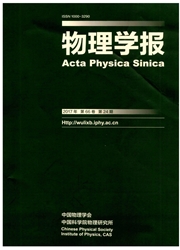

 中文摘要:
中文摘要:
用高温熔融法制备了Bi203掺杂的(0.9-X)Ge02-xNb205.0.1BaO(含量X为摩尔分数,0=0,0.04,0.07,0.1)系列玻璃.测定了玻璃样品的差热分析(DTA)曲线、吸收光谱、发射光谱及x射线光电子能谱(XPS).从DTA曲线分析得到玻璃的结晶起始温度与软化温度之差(Tx-Tg)达200°C以上.吸收光谱中可观察到位于500,700,808和1000nm处的吸收峰,并随着Nb205含量2的增加吸收边带发生红移.在波长为808nm激光激发下,观察到发光中心位于1300nm处、荧光光谱半高宽约为200nm的宽带发光.荧光强度随Bi203掺杂量6的增加先增强后减弱,当掺杂量d达到约0.01时,荧光强度达到最强.随着Nb205含量0从0.04增加到0.1时,荧光强度逐步减弱.样品的XPS峰分别位于159.6和164.7eV,它们介于Bi3+与Bi5+的特征结合能之间,因此Bi3+与Bi5+可能同时存在于玻璃基质中.从XPS及Bi离子的发光特性推断,宽带的荧光发射可能起因于Bi针.随着Nb205含量z的增加,荧光强度逐步减弱.分析认为,Nb205取代Ge02后形成了NbGe缺陷,需要低价Bi离子进行电子补偿,因而抑制了Bi5+形成,致使荧光强度减弱.
 英文摘要:
英文摘要:
The Bi2O3 doped glasses with concentrations of (0.9 - z) GeO2-xNb2Os-0.1BaO (x = 0.04, 0.07, 0.1) glasses are prepared by the conventional melting method. The differential thermal analysis (DTA) curves, the absorption spectra, the fluorescence decay curve and the X-ray photoelectron spectra are measured. The difference between glass crystallization onset temperature and transition temperature (T, - Tg) of the glasses is up to 200 °C from the DTA curve. Absorption peaks at 500, 700, and 1000 nm are observed. The absorption edges show a red-shift with the increase of Nb2 05 content x. The emission band at 1300 nm with the full width at half maximum near 200 nm is observed under the excitation of 808 nm laser. The fluorescence intensity increases with the increase of the concentration of Bi203. The fluorescence intensity reaches a maximal value when the concentration 3 of Bi203 is about 0.01. Thepeaks of binding energy in XPS are located at 159.6 and 164.7 eV respectively. The binding energy peaks are located between those of Bi3+ and Bi5+ by comparing with those of Bi203(Bi3+) and NaBiO3 (Bi5+). According to the XPS results, one may conclude that Bi3+ and Bi5+ ions co-exist in the glass. The near infrared broadband emission may be assigned to Bi5+ ion based on the results of emission spectra and X-ray photoelectron spectra. The broadband intensity is gradually weakened as the Nb2O5 content :r increases from 0.04 to 0.1. As GeO2 is substituted by Nb205, complex NbGe defects are formed and the lower valence state of Bi ions will be inevitably formed to compensate the extra electric charge from Nb5+, thus resulting in the inhibition of Bi5+ and weakening the fluorescence aforementioned.
 同期刊论文项目
同期刊论文项目
 同项目期刊论文
同项目期刊论文
 期刊信息
期刊信息
